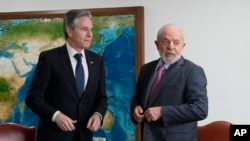U.S. Secretary of State Antony Blinken met with Brazilian President Luiz Inacio Lula da Silva on Wednesday, briefing him on U.S. efforts to end the Israeli-Hamas war in Gaza but also telling him the U.S. disagrees with his assessment likening Israel’s war effort to that of Nazi genocide in World War II.
A U.S. official privy to the talks in Brasilia said the leaders had a “frank exchange” about the war, now in its fifth month, but declined to characterize Lula’s response to Blinken’s criticism.
Blinken “talked about all the efforts [the U.S. is] making, not just as it relates to Gaza itself, but in the broader region, that we think is the path to doing that. … The president seemed to appreciate the efforts the U.S. is making to do that,” the U.S. official said.
Blinken and Lula did not discuss the U.S. veto Monday of a U.N. Security Council resolution calling for an immediate cease-fire in the war, the official said. The U.S. has been committed to discussions, so far unfruitful, involving Israeli, Eqyptian and Qatari officials targeting a more limited halt to the fighting, accompanied by the release of the 100 or so remaining hostages held by Hamas in Gaza.
Lula’s comments likening Israel’s attacks in Gaza to the Holocaust came after he visited the Middle East last week and just ahead of a meeting of foreign ministers in Rio de Janeiro as part of Brazil's presidency of the G20 group of advanced economies.
Israel said Monday that Lula is not welcome there until he takes back the comments.
The U.S. official said Blinken emphasized the American commitment to support Lula’s G20 agenda to combat hunger, protect the global climate and improve global governance.
“Our hope would be that in the meetings we’re going to have [in Rio] that that would be [the] focus of how these countries, the G20 countries, have the responsibility to work together to address these shared challenges,” the U.S. official said.
The official also said the leaders discussed “the importance of strengthening democracy in the region and Venezuela particularly.”
VOA’s Nike Ching contributed to this report from Rio de Janeiro.





